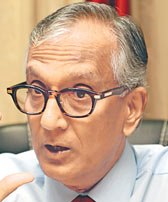|
We are doing our best - Raj Obeysekere, Chairman,Sri Lanka Foreign
Employment Bureau
|

(Photo by Thilak Perera) |
Q: The Third Senior Officials' Meeting of the Colombo Process
was held in Colombo this November. What was the outcome?
A: The reintegration of the returning workers was one of the
main areas of focus. This was shared by all labour- sending countries. A
mechanism to support migrant returnees was discussed.
We want to see them reintegrate into society and become comfortable
in their original places. We also want to find them economically
advanced after their stints abroad.
The decisions taken need to be implemented. The first priority is
their safe return. Their health and welfare are extremely important. We
are also extremely keen to ensure that they are empowered to use their
developed skills in a more productive way and to enable to generate an
income.
Q: The majority of migrant workers go to the Middle East and
many go as domestic workers. Is there a change in this trend?
A: The number of skilled workers is increasing. It is true
that the majority go to the Middle East.
Q: What action have the authorities taken to avert the death
of a Sri Lankan domestic worker who is to be stoned to death for
committing adultery?
A: We are doing our best. The Ministry has hired lawyers who
are working through the Saudi Embassy. The particular woman's legal fees
are being paid by us. Negotiations are ongoing.
Q: This is not the only Sri Lankan migrant worker who is
condemned to death. There are others in death row and domestic workers
are the most vulnerable. What has the SLBFE has done to safe guard them?
A:
There is pre-departure training by the SLBFE. We include
lectures, documentary films and videos showing the most horrific
situations that people can get into while working in the Middle East. We
also instruct them about safe migration. This is taught in addition to
etiquette, language, cleanliness and handling of equipment. There are
sessions on legal frameworks and how to stay safe. We instruct them on
how to be careful.
But only about 2% of domestic workers face such problems. Others
return home safely and with reasonable savings. Migrant workers should
work through the SLBFE for enhanced protection. This institution is
there for them. Yet, data shows that nearly 40% of labour migrants go
through unauthorised means.
Q: It appears that many women are vulnerable in the Middle
East. What specific action has the SLBFE taken to monitor their
interest?
A: We give them a clear picture; the reality of working
overseas as domestic workers. We prepare them in different ways. They
are taught the Sri Lankan and the Sharia Law.
Migrant workers, particularly the women, are aware of the possible
consequences of the choice they make.
When specific videos were screened by the SLBFE during training
sessions, labour recruitment agencies protested. They said it will
discourage women from seeking employment abroad. But we continued to
screen these videos because migrant workers must know the ground
situation of the country they are heading to for employment. According
to statistics untoward situations have been reported by a mere 2 - 3 %
of women out of the total who migrate for work to the Middle East.
We have replaced a majority of the labour counsellors attached to Sri
Lankan embassies with a large concentration of Sri Lankan migrant
workers. We have strongly advised them to remain alert. The numbers are
insufficient to handle the large number of migrant workers who face
issues.
Q:
The conduct of agents and sub agents remain a key issue.
What has the SLFBE done to regulate the situation?
A: Even though we re-register these agents annually and
monitor them closely, the SLBFE does not have any power to cancel their
licences. We can only suspend the license. Due to the various safety
concerns of workers, we now have monthly meetings with agents. e strict
with sub agents. Though we have limited the number of sub agents to two
per agent, there seems to be more. Some critical decisions will have to
be taken with regard to them. |

